Interview with Alexandre Claris
World #5 in freestyle slalom at the 2014 WSSA World Ranking, 4th in speed slalom, 5th in slide... There's no doubt about it, Alexandre Claris is quite a skilful skater! We've interviewed him on the docks of Bordeaux, France to know a bit more about him...
Par alfathor
Interview
I started at 5, it’s been a while already. I was 5 in 2000.
Did you start with slalom or with general skating?
I started with skating school. Then I did one year of rink hockey, because I was -and still am- at the SAM skating club. Since it’s a rink hockey club, I naturally started with rink hockey. But I didn’t like it so I stopped after one year and started slalom for a year, then two, three years… It’s one more year this season, and there will be another one next year, I think…
How old are you now?
19.
So you’ve been skating for 14 years.
Already, yes.
And you did quad skating?
Quad skating? No, never.
Never? Even at the SAM (a French Club)?
For rink hockey, yes I had to. But sensations are really different on quad skates and I like inline sensations far better.
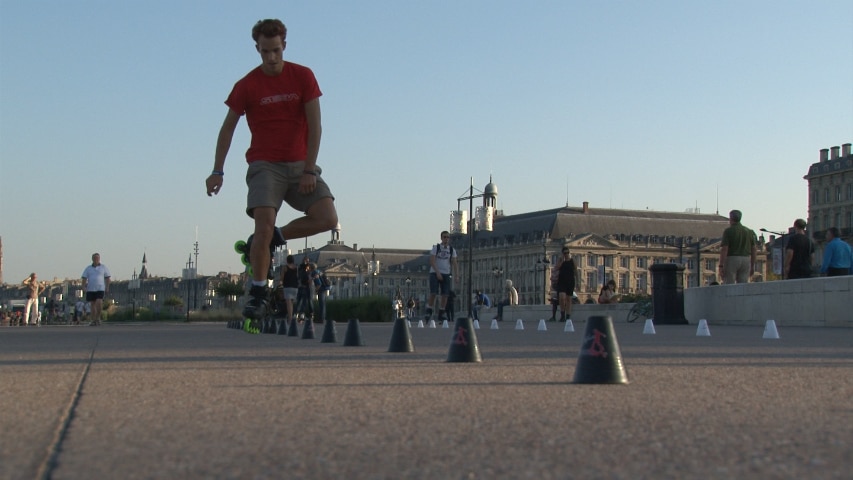
So you’ve never tried to slalom with quad skates?
No. I respect the skaters who do, I won’t name anyone, you know who you are, but I just can’t.
Have you tried other disciplines?
I’ve tried skate cross this year. I want to have a go at speed skating and I’m starting aggressive skating too. I’m trying to see a little of all the environments of skating, but the one I like best remains slalom.
Besides skating, have you tried any other sports?
When I was younger, I did track and field for 7 years, which helped me a lot for skating. Now I’ve reached a point where two sports aren’t compatible with studies and I had to make a choice, I chose skating.
How did track and field help you for skating?
I learnt a lot from it for interval training, that is to say efforts of short duration, because I was specialized in sprints and 400 m races. For us in skating, a Classic is 2 min and a Battle run is 30 sec, which are very short efforts. It helped me a lot for physical fitness.
Then you do speed slalom, battle, I guess a bit of Classic too, it means that you’re very skillful!
Yes, I’ve tried every discipline. On competitions I didn’t like seeing the others doing a discipline and staying in a corner doing nothing, so I got into the habit of doing everything, and I liked it. And I keep on doing everything. I’m doing slides too now, and I like it. So that now every time there’s a slide contest at a competition, I systematically register for it.
But your main focus remains slalom?
It does. I started with speed and Classic slalom, and now I’m a battle enthusiast too. Those three disciplines remain my main focuses.
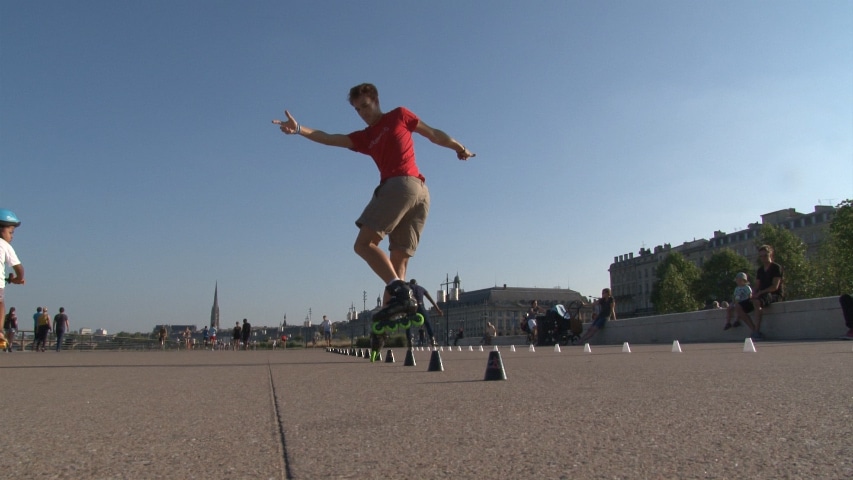
When did you start making results?
Let’s say during the 2009-2010 season when I entered the French Team. It enabled me to discover new horizons, going to Asia for the 2010 World Championships whereas I had never traveled before. I learnt a lot on those trips. Then there was also my partnership with Seba which helped me a lot traveling, with 12 to 15 contests per year everywhere in Europe. It helped a lot. The first year was a little empty but I acquired a good deal of experience. And traveling is really motivating. And results followed.
Your best titles lately?
Lately… There’s one, the one I like best, that of European Champion of Battle in 2012. I am the 2013 European vice champion of battle, and this year I’m expecting good results. I won’t say that I’m on the good way to be the 2014 European champion because if I don’t, it sucks. But I feel ready, and I hope to bring medals back home.
In Germany?
No, this year it’s in Busto. It’s next weekend, next to Milan, so fingers crossed!
It changes.
Yes it changes. Last year was in Warsaw, the year before in Berlin, and next year we don’t know yet.
What is your goal for next season? I mean, your season is not over yet…
No, it’s not. Our seasons are from January to December. We’re reaching the end, with the big dead lines. There are still the European Championships next weekend, and the World Championships next month, in Paris. And then there are competitions in the Southern hemisphere with a competition in Singapore, and there’s South America too, but we’ll see because that’s a lot of traveling. I have to check with my studies if I can go.
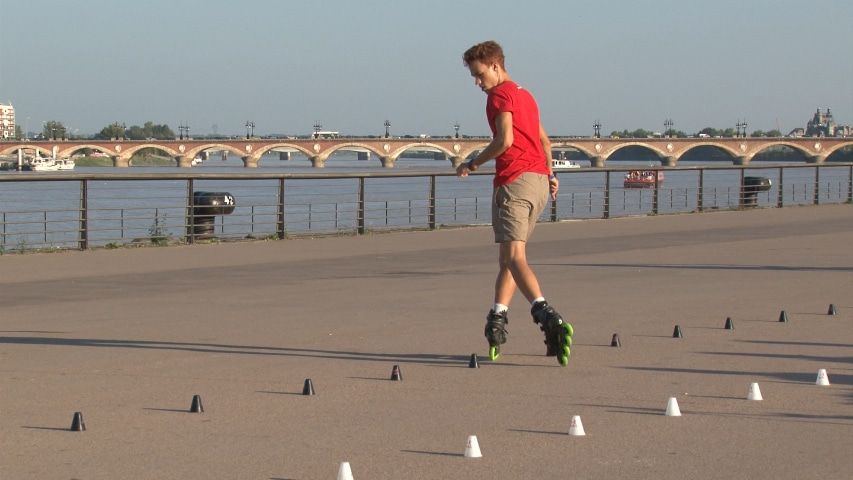
Who are the big names, your main opponents, the ones who give you something to worry about?
It’s always the same names: In France, there’s Romain (Lebois), and now Teddy Thierry is rising. On the European scale, the Timchenko brothers have been there for a coupe of years but this season they are showing that they are not here for nothing. They are the dangerous ones in freestyle. As for speed slalom, you’ve got the Italians as always, the country of speed slalom. And on the French side, Yohan Fort is making his comeback with his little brother. They are not here to twiddle their thumbs.
You haven’t said a word about Asian skaters. Yet they have dominated the freestyle world over the last years. What’s going on? Are they stepping back a little, are the Europeans coming back with a vengeance?
In fact, before we wouldn’t mix much with them. We would talk about them from a distance and say: “Oh they can do that” – but we didn’t know much, we didn’t really know them. And now we do know them and we know exactly what they can and can’t do, so that there’s less mystery and we are less apprehensive. But we know too well that on competitions, there are two of them, when they are there, there’s no need to argue, it’s: “Who will be second?” In Asia there’s Zhan Hao and Yao Xin, two Chinese skaters of 15 and 14 I think, and they win everything. The only one who can, and who did tickle them at the last competition, is Russian Sergey Timchenko, who showed them that Europeans were ready to fight too, since he won in Shanghai!
Which types of tricks make the difference for the first places on competitions nowadays?
It depends on the disciplines. In Classic, now you have to try to match the music. You have to follow the beat and all the rhythms of the music and show big technical combos at the same time, so it’s not easy because a super hard combo made off beat is worth nothing anymore. As for Battle, you’re on one wheel and you have to prove that you’ve got the biggest calf muscles, go in every direction, forwards, backwards, right, left. On the one hand it’s very technical and on the other hand it’s more artistic. As for speed slalom… you have to be the fastest, it’s pretty simple.
Just like in track and field, it’s more simple.
Indeed, there’s no judging. There’s still the first cone judgement, but it’s starting to get better because now we have cameras on the first cone, so that we know if it’s skated or not. But yes, for speed slalom, first arrived, first served.
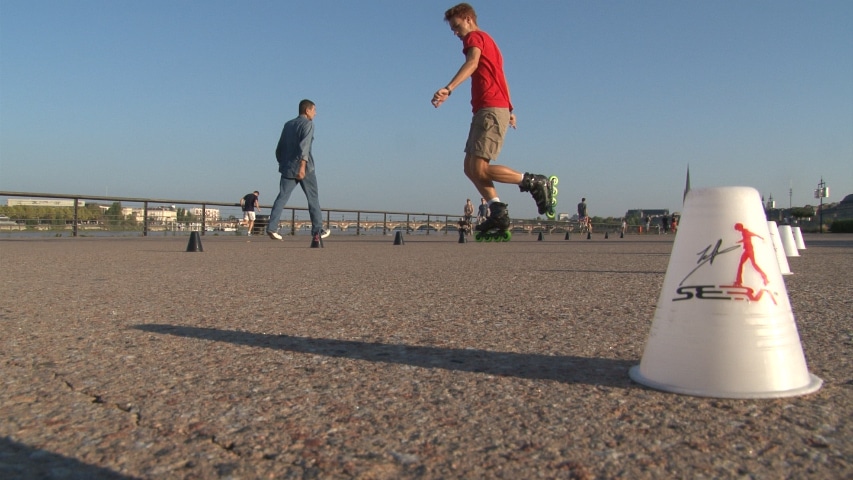
We are going to talk about more personal stuff, what do you study?
I’m entering a business BTS training in Bermont, next to Bordeaux. I won’t have as much time as last year, because I was at the university. If I’m not at the university anymore, it’s because I’m not made for the university, or the university is not made for me. This year, I’ll have less free time. But we get on well with the school I go to, so it should be fine, I’ll be able to get leaves to go to competitions.
You’re managing to have specific adjustments, then. Because you don’t have the status of a high-level athlete, do you?
Actually I am a high-level athlete since I’m part of a French Team that is recognized by its federation. I’ve managed to get the status.
Even in Freestyle, then!
Even in freestyle. Yet I have the status, but the discipline is not written on it. It’s “skating”.
And what is your professional objective afterwards?
I don’t have a very precise idea for my professional objective, but I would like to work in trade. Trade is very vast, but I’d like to remain in the world of skating.
If there was more money, would you see yourself as a professional skater?
Professional, it makes you dream, but I’m not sure. Because you have to train every day. If you’re a professional athlete, that’s all you do, you have to wake up every day, put your skates on. When you don’t feel like it, you still have to… I don’t think I’d like it to be a professional sport. I’d prefer that it remained a passion, so that you can skate whenever you want. And when you don’t, you just don’t!
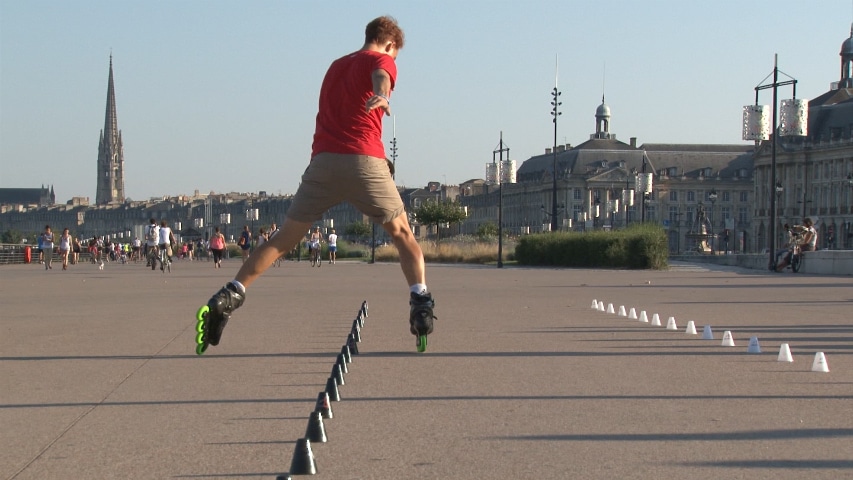
How much do you train?
Not that much, I train 2 to 3 times a week to the max, and yet, it’s getting more and more difficult. For example during the holidays, I managed to stay longer than just a weekend on competitions. For a competition of 2-3 days, I would try to stay for a week, to be with the organizing club and skate with the skaters who take part in the competition. I don’t have much time to train with my headphones, nobody around, my line… That was before.
Are there any training camps organized?
Yes there are training camps. There are Team France trainings, and there are also trainings organized by Yohan Fort. That’s if you want to be in a group. Otherwise, you find the motivation, go jogging in the morning, do abs, push-ups, and then you’re fit.
What is the content of your sessions, how do you structure them?
It’s not complicated. When I train, I put my headphones on, search a playlist, a track with a good beat and here we go. I turn on the volume to the max, I can’t hear anything around me, and for one or two hours, I slalom. I train on a trick, on a combo. Once I’ve succeeded, I do it again to make sure it wasn’t luck. If it’s too easy then I’m not satisfied, because it means that it’s too simple. If I can’t do it, I keep on doing it until it works. And if it does, then it was too simple in the end. Never satisfied, always wanting more.
You don’t have any methodology like: If I manage a trick, I do it reverse or on the other foot or…?
No, I don’t. Currently I try to mix different types of tricks: doing a rotation like a seven and then keeping on with a reverse shift. That is to say rotating then going forwards. Breaking a rotation, that’s what I’m working on currently. Breaking rotations is not easy. Especially on one wheel. But it’s getting better, little by little.
Any physical workout?
That would be ideal. But skating remains a passion. That’s why if I have the motivation, yes, but otherwise I don’t.
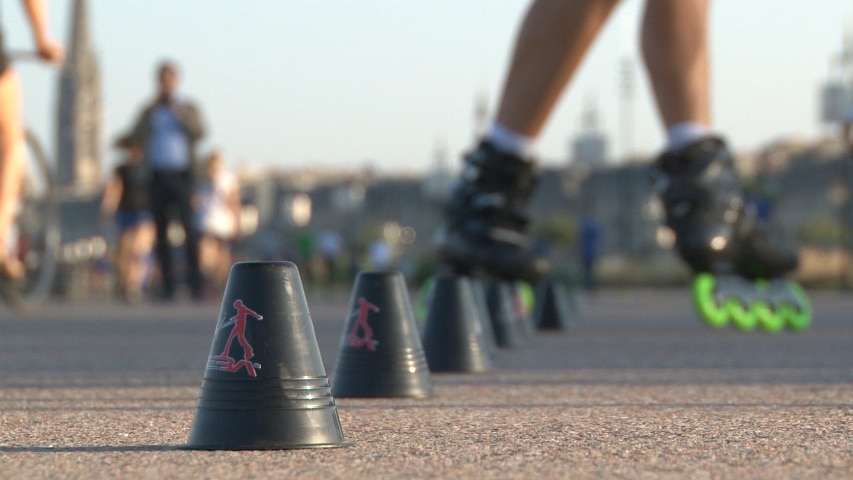
A little word on your partners?
Currently I skate a lot with Yohan and Jimmy Fort. They really boosted me up in speed slalom, because it does you good to train with people of your level, or higher for Yohan. It’s good to skate with them, it makes me get better. As for freestyle, it’s on competition in staying one week abroad with the local clubs. You exchange all you can do and in the end you go back home with new ideas.
Where is the place to be in France for slalom skating?
For slalom skating? The South-West.
So Bordeaux is cool?
Pretty cool. Look, in the French team, out of 10 skaters, we are 7 from Bordeaux. That’s the place to be for sure. We’re there, we welcome everyone.
The slalom spot on the banks of the Garonne river, next to the water mirror…
Next to the water mirror to cool off, there’s a little park too. There’s a slight slope but nothing’s perfect. The ground is good enough, and there’s always people skating here, so it’s really a great spot.
Do you want to speak about your sponsors?
My sponsors, well Seba. That’s the one who helps me the most, the one who’s enabled me to travel around the world those last 4 years, huge thanks to him – and to the group, it’s not just one person, it a whole group: him and the other members of the team, with whom we travel everywhere in the world. It’s such a crazy experience. I’m back from China, and I say to my friends: “So I was in China, it was nice.” And they’re like: “Yeah I was in Arcachon, it was great.” It’s a lifestyle, it’s a double life. Life with my friends on the one side, and life with Seba on the other side.
How do your school friends see your sport?
At first it’s like: “You do what? What skating? Never heard of.” And then there’s somebody who’s like: “I saw skaters with cones on the docks, is that what you do?” That’s what I do. At first they don’t know about it, but by repeating it over to more and more people, it’s starting to be known. There were the French Championships on the docks of Bordeaux with a lot of passers-by, so now people know that it’s a sport. The sport is growing. In the World Slalom Series there are more and more competition throughout the world every year. There was a competition in Malaysia lately, there are more and more events in South America… It’s not only at a French level, but in the whole world that Seba and his partners are trying to grow the sport.
According to you, how is the discipline evolving? Is it still evolving towards highly technical tricks?
 Yes it turns towards the technical side but on the other hand, the disciplines are specializing. Before you could be good at Battle and be okay at Classic, and conversely. Now, it’s two different disciplines. You can see it with the former world #1 Yu Jin Seong, who dropped down to #3 in August, he’d win everything in Classic but would be out at the first round in Battle. Those are two disciplines that are specializing, and Battle is becoming super technical. you have to sit, get up, skate in every direction, the one with the biggest calf muscles will win. As for Classic, there’s a more artistic side to it with a music, you’ll have to work for it, get to know your music, listen to it for two hours, know it by heart and think: at this moment there’s a musical peak, so I can do a technical move, here I should go in this direction… It’s more musical on the one hand, artistic, and super technical on the other hand.
Yes it turns towards the technical side but on the other hand, the disciplines are specializing. Before you could be good at Battle and be okay at Classic, and conversely. Now, it’s two different disciplines. You can see it with the former world #1 Yu Jin Seong, who dropped down to #3 in August, he’d win everything in Classic but would be out at the first round in Battle. Those are two disciplines that are specializing, and Battle is becoming super technical. you have to sit, get up, skate in every direction, the one with the biggest calf muscles will win. As for Classic, there’s a more artistic side to it with a music, you’ll have to work for it, get to know your music, listen to it for two hours, know it by heart and think: at this moment there’s a musical peak, so I can do a technical move, here I should go in this direction… It’s more musical on the one hand, artistic, and super technical on the other hand.
Have you ever done Classic Jam?
I have, when I was very young, when all I could do was one foot forwards and backwards. And when I saw the Asians do some jam I was like: “Ah. Yeah. We kind of missed the boat.” I don’t do jam because I think that you need a partner with the same skating style, it’s more pleasant to watch. Two different skating skating, it’s nothing special. Classic jam is hard, all the more as there aren’t much contests in France offering it, so we can’t train. Let’s say it’s reserved to Asians, that’s why they are world champions every year.
Do you want to add anything as a conclusion?
I would like to thank a lot of people from a lot of different places… The Polish, who helped me a lot. I had great experiences there, they motivated me and help be discover things in skating other than competition, meeting up with big groups of people and showing how to skate to people who don’t have a clue what it is about… And the Italians, I learnt to know them and they are great too. Thanks for the pink hair. There are people from everywhere. The Russians are awesome on competitions, you text them and they’re like: “No problem, don’t go to the hotel, stay at our place.” We are a community, with a great spirit. There is competition but we are all friends.
Great Alex, Thanks.
Welcome.
Links
Translation: Chloe Seyres
